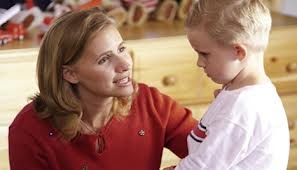 It has become commonplace to hear parents knelt down in a public place confronting their young child with some wrong which he/she has done with the words, “ that’s not nice, We don’t do that”. I forgo the temptation to suggest to the parent that, WE didn’t, He /She did. It is imperative from the very youngest years not to remove from a child responsibility for their actions.
It has become commonplace to hear parents knelt down in a public place confronting their young child with some wrong which he/she has done with the words, “ that’s not nice, We don’t do that”. I forgo the temptation to suggest to the parent that, WE didn’t, He /She did. It is imperative from the very youngest years not to remove from a child responsibility for their actions.
There are two primary reasons parents remove the responsibility squarely from a child’s shoulders: to avoid the child having to “feel bad” and to avoid confrontation. As far as the issue of “feeling bad” goes, humanistic philosophy has so permeated our culture that we often do not recognize it creeping into our own parenting. Humanism is concerned with humans having to suffer under “bad” feelings about ourselves. However, Biblical philosophy is concerned with the human need to take responsibility for our actions. There are three parts to Biblical responsibility; first the human need to rightly understand our guilt, next acknowledge it, and finally, under the weight of legitimate guilt, be moved to repent. If our children learn to take responsibility, they are going to “feel bad” at times. As far as avoiding conflict, Christ Himself was certainly not one to shirk a good battle for a worthy cause. Conflict is inherently a part of parenting. You child knows exactly which situations they can win in due to your discomfort with confrontation. Take some time to plan what you will do in the future to make use of confrontational situations as opportunities to teach truth.
A parent’s goal must be to develop a sense of personal responsibility in their children. As the parent you have a unique opportunity in the young years of your child’s life (an opportunity which, once lost will not be re-offered) to teach your children how to take responsibility. Instead of offering to lighten, share or remove their guilt, show them the process of managing it responsibly.
Let’s say the little nipper just hit another child in a nursery and the other child is crying. Kneel down next to little Festus, put your arm around him, and empathetically say “look, she is hurt. You hit her arm and now she is crying from the pain”. Some children will feel bad easily, others may need a little working over! Ok, just kidding about the working over, well…half kidding. The goal is not to work them over per se, but it is a goal to have them understand their guilt, feel legitimate shame, and subsequently move them toward reconciliation.
Questions or Comments,
Chris Clevenger
Comments or questions are welcome.


